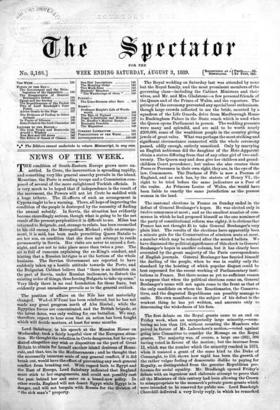The Royal wedding on Saturday last was attended by none
but the Royal family, and the most prominent members of the governing class—including the Cabinet Ministers and their wives, and Mr. and Mrs. Gladstone—a few personal friends of the Queen and of the Prince of Wales, and the reporters. The privacy of the ceremony prevented any speciallocal enthusiasm, though large crowds collected to see the bride, escorted by a squadron of the Life Guards, drive from Marlborough House to Buckingham Palace in the State coach which is used when the Queen opens Parliament in person. The wedding presents were many and splendid, and are said to be worth nearly £200,000, some of the wealthiest people in the country giving jewels of great value. What was perhaps the most striking and significant circumstance connected with the whole ceremony passed, oddly enough, entirely unnoticed. Only by marrying an English nobleman did the daughter of the Heir-Apparent obtain a status differing from that of any other girl of two-and- twenty. The Queen may and does give her children and grand- children Court precedence ; but unless she also creates them Peers or Peeresses in their own right, they are, in the eye of the law, Commoners. The Duchess of Fife is now a Peeress of England, and as such has, by the statute of Henry VI., the right to be tried before the same judicature as a. Peer of the realm As Princess Louise of Wales, she would have been liable to exactly the same jurisdiction as the poorest woman in the land.


































